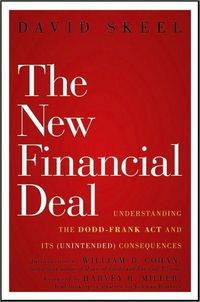

Purchase
The New Financial Deal
David Skeel
Understanding the Dodd-Frank Act and Its (Unintended) Consequences
John Wiley & Sons Inc
December 2010
On Sale: December 7, 2010
240 pages
ISBN: 0470942754
EAN: 9780470942758
Hardcover
Add to Wish List
Non-Fiction
What can we expect from our era’s New Deal? To answer this
question, The New Financial Deal will begin with an inside
account of the legislative process, then outline and access
its key components: the new framework for regulating
derivatives, the regulation of banking and systemic risk,
and the new resolution regime. It will explain the
implications of the new framework, and propose correctives
that would better align its ostensible objectives—such as
preventing future bailouts—with the new regulatory
structure. The legislation’s key theme is government
partnership with and regulation of large concentrated
institutions in order to reduce their risk and manage their
failure. In place of the decentralized pre-crisis regulation
of derivatives, the new legislation will require that most
derivatives be cleared through a clearing house and traded
on exchanges. The stability of the derivatives market will
therefore depend on a small number of potentially enormous
clearing houses. For large financial institutions that
encounter financial distress, the legislation gives bank
regulators sweeping new authority to step in and take over
the institution. Regulators, rather than negotiations among
the parties themselves, will determine the outcomes. These
epochal reforms are posed to change Wall Street forever, but
whether they help to regulate supermarket banks or create
even more moral hazard is worthy of serious debate.
Comments
No comments posted.
Registered users may leave comments.
Log in or register now!
| 


 © 2003-2025 off-the-edge.net
all rights reserved Privacy Policy
© 2003-2025 off-the-edge.net
all rights reserved Privacy Policy